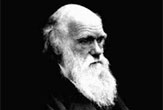Fear of Death Spurs Belief in Intelligent Design

When faced with the thought of death, people are more likely to believe in intelligent design, the idea that life on Earth and other features of the universe can be explained by an "intelligent being" guiding the process, a new study finds.
"People want to see science as providing their life with greater meaning, and on the surface, intelligent design does that whereas evolution does not," said study researcher Jessica Tracy, of the University of British Columbia. "It might help explain why there is such intense widespread support for intelligent design."
Thinking about death is known to have many psychological impacts. These impacts protect us from the fear of leaving this world. "We try to forget most of the time that we are mortal," Tracy told LiveScience. "It's impossible to forget, it's real, it's out there, it becomes harder and harder to deny that."
Often fear of death is tempered by a religious belief in the afterlife or the soul, but none of the ideas (intelligent design, evolutionary theory and naturalism) supposedly hold religious overtones or claim the existence of an afterlife. Still, belief that life is guided by a creator is enough to help dull this fear of mortality, Tracy said.
"The whole reason we have religion is that it is comforting. Intelligent design is doing something very similar," Tracy said. "Traditional science's goal isn't to comfort; there really is no goal other than to understand."
The basics
Intelligent design is the idea that some parts of the universe and of living things are best explained by an intelligent cause, not an undirected process such as natural selection and evolution. It is similar to creationism, the idea that God created the Earth and all of its inhabitants, but is often framed as a scientifically valid theory and makes no mention of who or what this "intelligent cause" is, doesn’t mention the afterlife and doesn't explicitly espouse a religious ideology. It is not based in science.
Get the world’s most fascinating discoveries delivered straight to your inbox.
Evolution is the scientifically supported idea that all of Earth's creatures developed spontaneously and through a process called natural selection, in which the best genetic traits get passed down to offspring.
A Gallup poll in 2010 found that 40 percent of Americans still believe in creationism — a literal interpretation of the Bible that says humans were created by a Christian God less than 10,000 years ago. Thirty-eight percent of Americans believe that humans were "intelligently guided" into being by a creator, while only 16 percent reported accepting evolution.
Thoughts about death
Tracy ran several studies testing the effects of the fear of death (primed by instructing study participants to think and write about their death) on belief in evolution and intelligent design.
After thinking about death, the participants were instructed to read over passages from either intelligent design proponent Michael Behe or by evolutionary biologist Richard Dawkins. More than 1,600 participants answered a variety of questions about their feelings on intelligent design, religion, evolution and the authors of the passages — rating their agreement with each theory.
Some of the participants also read a passage by Carl Sagan on naturalism, the belief that even without a creator, human life still has worth and meaning.
In general, researchers found that when confronted with thoughts of death participants liked the idea of intelligent design more (or the idea of evolution less) than when they thought about the pain of a dental visit. The effect was small, but statistically significant.
The researchers also found that they could reverse this effect by following the intelligent design and evolution passages with the passage by Sagan. So even for those primed to think about death who showed a stronger acceptance of intelligent design, that effect went away after they read Sagan's passage. The only group that didn't show this was a group of natural science students. They responded to thoughts of death by increasing their support of evolution.
Inspired intelligent design
"What intelligent design does explicitly say is there is a purpose to human life. ... That we are here for a reason and there is a larger purpose to it," Tracy said. "That's an incredibly different idea than evolution."
If people fear the emptiness of an evolution-based worldview, perhaps stressing a naturalist option is important when discussing evolution. "Teaching people that science or a naturalist view can be meaningful makes people more interested in the theory that has actual scientific validity even when they are in a state of existential anxiety," Tracy said.
The study was published in the March 2011 issue of the journal PLoS ONE.
You can follow LiveScience staff writer Jennifer Welsh on Twitter @microbelover.
Jennifer Welsh is a Connecticut-based science writer and editor and a regular contributor to Live Science. She also has several years of bench work in cancer research and anti-viral drug discovery under her belt. She has previously written for Science News, VerywellHealth, The Scientist, Discover Magazine, WIRED Science, and Business Insider.



